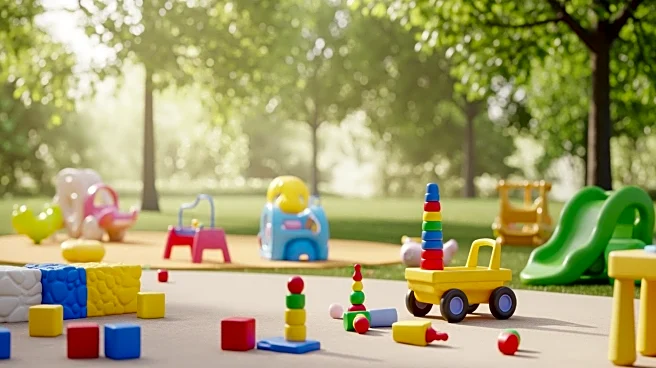What's Happening?
New Mexico has become the first U.S. state to offer free child care to all residents, a move aimed at boosting the state's economy and improving education and child welfare. The program provides state vouchers to cover both public and private child care fees,
regardless of family income. This initiative is part of a broader effort by New Mexico to expand access to free child care, following the establishment of the Early Childhood Education and Care Department in 2019. The program is expected to save families significant amounts of money, with some, like Taos special education teacher Allyson O’Brien, anticipating savings of around $12,000 annually. To support the program, New Mexico plans to create nearly 14,000 additional child care slots and recruit 5,000 educators. The state is also setting up a $12.7 million low-interest loan fund to build and expand child care facilities.
Why It's Important?
The introduction of free child care in New Mexico is significant as it addresses both economic and social challenges. By alleviating the financial burden of child care, families can allocate resources to other needs, potentially reducing poverty levels in a state where nearly 18% of residents live below the poverty line. The program is funded primarily through the state's oil and gas revenues, highlighting a strategic use of natural resource income to support social welfare. Additionally, the initiative is expected to improve educational outcomes, particularly for low-income families, by providing quality early childhood education. This move positions New Mexico alongside countries like Norway and Belgium, which offer similar universal child care services.
What's Next?
To fully implement the universal child care system, New Mexico will need to address the challenges of expanding capacity and recruiting qualified educators. The state plans to increase reimbursement rates for child care providers, which could help attract and retain staff. However, critics, such as New Mexico State Representative Rebecca Dow, argue that the program may not be sustainable and suggest alternative solutions like tax credits for families. The success of this initiative could influence other states considering similar programs, potentially leading to broader national discussions on child care policy.
Beyond the Headlines
The move towards universal child care in New Mexico raises questions about the role of government in providing social services and the balance between public and private sector involvement. It also highlights the potential for natural resource revenues to fund social programs, a model that could be explored by other states with similar economic structures. The program's impact on family dynamics and workforce participation, particularly for women, could also be significant, as it may enable more parents to pursue employment or education opportunities.
















